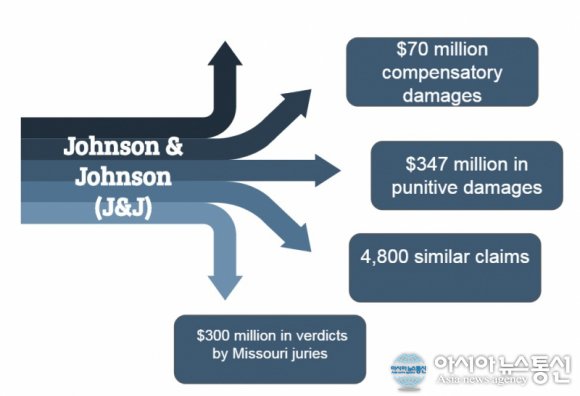 |
| Photo By: Open Grid Scheduler / Grid Engine / Flickr |
A California jury has ordered Johnson & Johnson (J&J) to pay Eva Echeverria, 63, $417 million after she claimed to have developed ovarian cancer after using talcum-based products for feminine hygiene since she was 11 years old. The Los Angeles Superior Court jury's decision was the largest lawsuit, so far, to charge J&J for failure to sufficiently caution consumers about the cancer risks of their talcum-based products.
More than 300 lawsuits involving J&J are yet to be settled in California and over 4,500 more claims are awaiting judgment in the rest of the USA. The claims have it that J&J has brushed aside studies that link Johnson's Baby Powder and Shower to Shower products to cancer.
In a statement, Mark Robinson, Echeverria's lawyer, expressed his gratitude over the jury's verdict.
The $417 million payment features $70 million in compensatory damages and $347 million in punitive damages. This recent defeat is a major blow for J&J, which has been dealing with 4,800 similar claims. So far, the personal care firm has been hit with over $300 million in verdicts by Missouri juries.
But jurisdictional questions have been hounding the Missouri cases, following the US Supreme Court's issuance of a ruling that limited the number of personal injury lawsuits that can be filed.
Meanwhile, J&J will be appealing the verdict since they claimed that science has been governing the company and it is also supporting its Baby Powder's safety.
 |
The company's lawyers contested that numerous scientific studies and federal agencies, such as the US Food and Drug Administration, had not deemed their talc-based products as carcinogenic. The study made by Harvard University's researchers, which was part of the National Nurses Health Study of more than 121,000 women, including 78,630 who claimed that they used talc, was among the studies that the company presented in the trial. In that study, researchers have declared that there was "no overall association" between talc use and "epithelial ovarian cancer." However, invasive serous ovarian cancer, a variety of this disease, has a "modest elevation in risk." Court papers declared that this certain variety is the one cancer that Echeverria has sustained.
According to the National Cancer Institute, epithelial ovarian cancer is the most common variety of ovarian cancer. The said variety starts in the tissue that covers the ovaries. In some occasions, cancer starts at the end of the fallopian tube near the ovary and spreads to the ovary. It can also start at the peritoneum. The stages and treatments are the same for ovarian epithelial, fallopian tube, and primary peritoneal cancers.
The ovarian germ cell tumor, a rare type of ovarian cancer, is another variety that starts in ovary's germ (egg) cells, while the ovarian low malignant potential tumor (OLMPT) is a variety where abnormal cells form in the tissue that covers the ovaries. OLMPT becomes full-blown cancers in rare occasions.
The National Cancer Institute has also reported that ovarian cancer composed 1.3 percent of all of US' new cancer cases, and it is also the eighth most common cancer and the fifth-leading cause of cancer-related deaths among women, since this cancer does not manifest early symptoms and there are no good quality screen tests that will do the job.
Echeverria's lawsuit was the first of many California talc cases to undergo trial.
The lawsuit claimed that Echeverria has developed terminal ovarian cancer after decades of consuming J&J products, while her lawyers highlighted that J&J invites women to use the products despite knowledge of studies that link ovarian cancer to genital talc use.
Meanwhile, the lawsuit recognized a 1982 case study that warns women about the 92-percent risk of acquiring ovarian cancer by using talc on their genitals. Daniel Cramer, lead researcher, has recommended that the company should place a warning label on their talcum-based products.
Additional source: https://www.cancer.gov/types/ovarian

